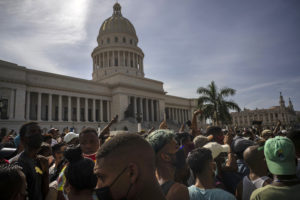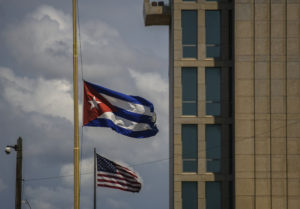By Geoff Thale
Rep. Paul Ryan (R-WI), Mitt Romney’s choice as running mate on the Republican presidential ticket, once favored lifting the embargo against Cuba. But in recent years, he changed his position. Florida Rep. Ileana Ros-Lehtinen (R-FL), one of the most outspoken defenders of the embargo against Cuba, said that Rep. Ryan “spent time learning the true nature of the Castro regime.”
Given Rep. Ryan’s extensive anti-embargo voting record, he must have needed a great deal of education. Rep. Ryan held a strong libertarian anti-embargo position until 2005. In 2001, he was a member of the Cuba Working Group, a bipartisan group of representatives who worked to change U.S. policy toward Cuba. In 2002, he
told the
Milwaukee Journal-Sentinel that “the embargo doesn’t work” and that the “more we have a free exchange of people and ideas and customs, the more the people of Cuba will be exposed to the values of freedom and liberty.” His voting record reflected these statements. Between 2000 and 2007, there were 24 roll call votes in the House of Representatives on measures related to the embargo on Cuba. Rep. Ryan, who entered Congress in 1999, voted to ease or end the embargo on 20 of those 24 votes. In fact, Rep. Ryan voted for easing or ending the embargo on every single vote from 2000 to 2005.
This is not the voting record of an “uneducated” member of Congress without strong opinions on the issue; it is the voting record of a member of Congress deeply committed to ending the embargo.
WOLA’s position is that the embargo is counterproductive and detrimental to the human rights situation in Cuba; we think that Ryan’s record on Cuba is admirable.
But, in 2006, Ryan’s voting pattern began to change. In that year, he split his vote: he voted in favor of ending the embargo, but he also voted for Rep. Diaz-Balart’s (R-FL) proposal to force any country listed by the State Department as a State Sponsor of Terrorism (i.e., Cuba) to file regularly with the U.S. Attorney General a list of all “lobbying contacts” with legislative branch officials. In 2007, he voted to increase USAID funding for dissidents in Cuba and to prohibit the use of private credit to finance agricultural sales to Cuba. Even as his votes changed, as late as 2008, Rep. Ryan, in an interview with the
Milwaukee Journal-Sentinel,
asked: "If we're going to have free trade with China, why not Cuba?"
There have been no floor votes on Cuba-related issues since 2007, and both Governor Romney and Rep. Ros-Lehtinen have assured hardline supporters that Rep. Ryan’s “conversion” is both authentic and complete.
But Ryan’s many votes in favor of ending the embargo are not going away. Ryan's strong statements in favor of ending the embargo aren not going away, either. Will this be a problem for the Romney-Ryan ticket in Florida?
Maybe not. Contrary to conventional wisdom, not all Cuban Americans think like Rep. Ros-Lehtinen and other hardliners, who worry about Rep. Ryan and his Cuba votes. A 2011
poll conducted by Florida International University showed that 44 percent of Cuban Americans in Miami-Dade County
oppose continuing the embargo. Nearly half of the Cuban-American population agrees with Rep. Ryan’s many votes to end the embargo. As Rep. Ryan moves to embrace a Cold War mentality on Cuba policy, the Cuban-American community is increasingly moving into a new era of engagement. This is even truer when it comes to travel. The same Florida International University poll found that 57 percent of Cuban Americans in Miami-Dade County would like unrestricted travel to Cuba for everyone in the United States. In subgroups like Cuban Americans under the age of 45, those numbers go up to 74 percent. Since President Obama opened up family travel for Cuban Americans in January 2011, Cuban Americans have made more 400,000 trips to the island. The strong Cuban-American support for travel to Cuba and the popularity of family travel among Cuban Americans raises an important new question: has Rep. Ryan also changed his position on family travel for Cuban Americans?
Geoff Thale is WOLA’s program director. Mr. Thale has studied Cuba issues since the mid-1990s and traveled to Cuba more than a dozen times, including organizing delegations of academics and members of Congress.
(Photo by Gage Skidmore).


